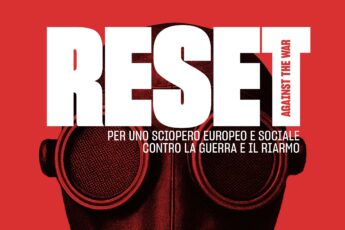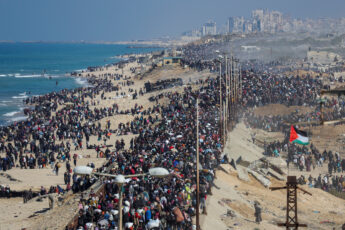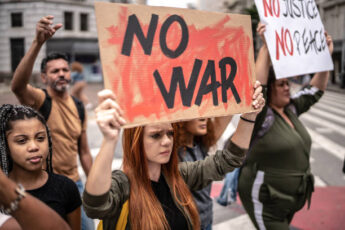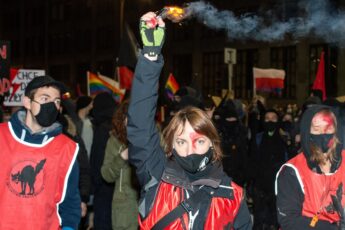
by CONVERGENX – WORDS AND PRACTICES IN MOVEMENT
We translated the report of the day of discussion “The war in Ukraine and our struggles”, organized by Convergenx in Bologna on January 15th and which is an important step towards the construction of a shared discourse of opposition to the war. Over one hundred people from different parts of Italy met to discuss the possibilities and difficulties of a politics of peace. Feminist activists, workers, migrants, anti-racists and ecologists, social centres, trade unionists, factory collectives, networks against the militarisation of the territory, and individuals discussed together the effects of this war on our struggles with the aim of understanding how the opposition to the war can become the terrain of a possible convergence. This report does not aim to make a synthesis of this heterogeneity, but to show that it is more necessary than ever to continue this collective analysis: while we all recognise the urgency of building an opposition to the war, we use very different, even contradictory words, interpretations, and focuses. Our aim is to ensure that these differences are not an insurmountable obstacle, but a resource for the collective construction of a shared perspective, made necessary by the urgency of the events taking place and the transformations they are accelerating, or triggering.
Accelerating or triggering: these two terms already make clear one of the matters that has characterized the entire discussion. How does the war in Ukraine relate to the set of crises – ecological, social, health, of production and social reproduction, of national and supranational political institutions – that we experienced even before its outbreak? What are the elements of continuity, what is the discontinuity with which the war in Ukraine forces us to come to terms? The three inputs of the first session – dedicated to war and patriarchy (Carlotta – Ambrosia Milano), migrants (Gianluca – Anti-racist activist, Trieste), and precarity (Cristina – Effimera) – insisted in different ways on the fact that we have to come to terms with all these aspects.
Not only in Russia and Ukraine, but also in Poland or Italy, the attack on women, on the freedom of abortion, on LGBTQI people, and the celebration of motherhood are nothing new. The war, however, is producing an “enlistment” of these discourses and corresponding policies within a material and symbolic horizon that decisively reinforces them. Motherhood is valorised in its patriotic dimension; the admission of women as volunteers in the Ukrainian army is proposed as an extension of their duties of “maternal protection”; the approval of the Istanbul Convention serves to make Ukraine, which until now had not signed it, a truly “European” country, a democratic bulwark against the Russian demon; millions of Ukrainian refugees are thrown back into the European labour market as an “army of care workers”. This instrumental use of bodies is not born with the war, but the war regiments it to reinforce the justification of patriarchal policies that allow all forms of opposition to be ignored and rejected. The question is then how to make the feminist perspective a rupture of the ideology of war and its effects – also by showing the possibility of politicising motherhood against its patriarchal enlistment, as the mothers of soldiers in Russia, who oppose the war, are doing – and how to trigger transnational bonds against it.
For what concerns migration, there are several ongoing processes on which the war intervenes: the externalisation and militarization of borders, the differential treatment of refugees, and the policies of refoulement. Looking at the Balkan route, these processes were the effect of the EU’s attempt to govern impressive migrant movements resulting from the 2015 war in Syria. The aim is not simply to block them, because the management of those movements is functional to that of the labour force and its illegality, which is the engine of entire production chains such as the agricultural one in the south of Italy. Thus, the differentiated reception of Ukrainian women as refugees has shown the elasticity of the asylum system, which leaves more and more room for arbitrariness based on the need for labour force and for a border policy bent on the strategic needs imposed by the war clash. This is evident in the redefinition of the equilibrium between the states on the Balkan route and the EU, which since the outbreak of the war in Ukraine has increasingly made migrants and the control of their movements an element of negotiation and blackmail in relation to the processes of political and economic integration.
Finally, on the domain of labour, the war in Ukraine is deepening a process of precarization that has been going on for decades. Precarity has been the response to subjective struggles and movements rejecting exploitation. This response has passed through the dismantling of labour laws, a constant production of poor labour, the individualisation of the risk of precarity, the emphasis on competitiveness for the valorisation of one’s human capital, and the economy of ‘promise’. On this terrain – further aggravated by the exponential increase in unemployment after the pandemic – the ideology and the material effects of war take hold: the former reinforces the idea that individuals should make it on their own by “fighting”, the latter – from the increase in gas prices to that of military spending to the detriment of welfare – intensify the compulsion to work by subtracting income and impoverishing wages. The problem then is to escape the grip of war ideology by developing a perspective that focuses on precarity in its regards. For example, by showing that the “Western front” is anything but united and homogeneous, by rejecting precarity and labour compulsion justified in the name of war, and by breaking the silence imposed on this rejection.
The problem of coming to terms with continuity and discontinuity in relation to the war in Ukraine also emerged from the inputs of the second session, dedicated to war and opposition to war (Crash Laboratory), war and globalisation (Sandro – Euronomade), war and ecology (Lara and Elena, Climate Social Camp) and war and state transformations in the USA (Felice – New York). A tension emerged from this second session between the recognition of the war as an intrinsic element in the process of capital reproduction, the need to question the specific meaning of this war in relation to the possibilities of mobilising against it, its ecological effects, and the transformations of the global order and its institutions in relation to transnational value chains.
The forms of opposition to war are inevitably multiple – e.g., fleeing, desertion, sabotage, strikes, the “war on war”, such as the one fought in Rojava – and there are no models to follow, because they depend on the positions of the subjects practising them. However, this war marks a departure from the wars of the early 2000s, the expression of an American exceptionalism that relegated war outside the West by making it a “peace operation” or international policing. If then the watchword of “resistance to war” was the trigger for an anti-war movement, now these conditions no longer seem to be in place, because with the conflict in Ukraine, war is once again becoming a legitimate instrument of international dispute’s resolution. The open problem is to make the opposition to war part of our struggles – at work, against patriarchy, against militarisation – and from there to respond to its disciplining effects by producing possible convergences between different struggles and subjects.
Looking at current events from the perspective of globalisation, its “end” was already announced during the pandemic. The tension between capital and political spaces has triggered a “hegemonic transition” in which war is a justified necessity. The war in Ukraine is different from the others because it touches the centre of a world system in crisis: the decline of US hegemony makes the war the instrument for building a new multipolar order. However, the war in Ukraine does not stop there, so much so that we can speak of a “regime of war” that affects our lives and our struggles, which requires us to reinvent internationalism within these new coordinates, to abandon Eurocentrism and to think of peace in “constituent” terms, not only as the absence of war but also within the perspective of transforming reality by reinventing the political spaces of our struggles.
Yet, the war in Ukraine can also be seen as an effect of a previous energy crisis, and its difference from other wars can be scaled down if we look at it from an ecological point of view, since it fits within the need for capital to activate new cycles of accumulation. Nevertheless, it is undeniable that war also has a very high ecological impact and that the current war in Ukraine is profoundly affecting industrial and energy policies. One only has to think of the investments of the Leonardo program that will reconvert Fiat’s factories to produce war materials, and how the war industry aggravates resource extraction processes that in turn have direct impacts on the basic conditions of reproduction of the lives of millions of people in different territories.
Finally, the war has wide institutional effects: in the United States, the transformation of the federal state dates back at least to the Obama presidency and coincides with the financial crisis from which emerged, among other things, the central role of giant investment companies such as BlackRock, which is already ready to take over the post-war reconstruction process in Ukraine. In the United States, the intertwining of finance, military apparatus and industry is increasingly intense, reinforced by the new strategic concept of NATO and its global projection. In front of the crisis of American hegemony, the war in Ukraine is an opportunity to test the strategic interference capacity of the United States in relation to transnational value chains, supported by an increasing role of executive power, also aiming to govern unprecedented processes of subjectivation that have emerged in the last years, from the feminist strike to the women’s march to Black Lives Matter. The question is whether and how opposition to the war can intertwine and activate these processes of subjectivation.
The last part of the day of discussion was opened by the question of what a politics of peace means in front of processes of this magnitude and of the difference of positions and readings on them (Isabella, precarious ∫connections). Despite the absence of an anti-war movement, there are experiences such as the Permanent Assembly Against the War, which will meet in Frankfurt on 10-12 February, which allow to practice a transnational communication capable of overcoming the divisions imposed by the war logic. This has been made possible by affirming that peace is not the absence of conflict, or social pacification and that we cannot rely on warmongering states to end it. We must demand the end of the war in Ukraine, but also oppose its material and ideological effects, the violence and coercion it imposes.
For example, this war is closing the spaces for ecological transition policies, which are already insufficient, and is offering the justification for the repression of the struggles taking place against the return to fossil fuels, as happened in Lützerath. We must continue to ask ourselves: how to build a struggle for peace capable of establishing connections between heterogeneous struggles, breaking the fronts imposed by war? How can we oppose the effects of war by recognising not only its local consequences, but also the need to counter them by articulating struggles in a transnational perspective? Can we really talk about a new order, or a regime of war, or do we have to face the problem of coming to terms with the disorder and unpredictability of this war, which makes it necessary to accumulate the strength to intervene in the contingency?
The debate on these questions involved all the collectives that participated (Radio Onda d’Urto – Brescia, Effimera, Iskra – Naples, Non Una di Meno – Reggio Emilia, Movimento No Base – Coltano, ∫connessioni precarie, Macao – Milan, Askatasuna – Turin, Collective against the war and the cost of living crisis – Modena, Sicobas, GKN Factory Collective, Euronomade, Bologna for Climate Justice) and many individuals. Here are some shared perspectives and some lines of tension that emerged from the last part of the day of discussion. We believe these lines must be kept open in order to take a next step that does not limit itself to recording the different positions in the field, but makes the effort to think collectively about the problems that those tensions pose.
The problem of continuity and discontinuity emerged again throughout the discussion, which not only concerns the understanding of the processes at work, but also has effects on the ways and possibilities of building an opposition to war, on what it means or can mean to create the conditions for a convergence against war, but also on how peace can be understood.
One perspective is the one which considers the “endemic” nature of war to capitalism: war is necessary for its reproduction and is a response to its crisis, and other recent wars, starting with those in the Balkans and Syria, have made this clear. From this perspective, anti-capitalist struggles are already immediately struggles against all wars. Others have emphasised the difference of the war in Ukraine compared to other wars: it is a war taking place on Europe’s doorstep, which can be compared to previous world wars in terms of its scale, and which can be seen as the first large-scale war that fully fits within the climate crisis, due to its inextricable intertwining with the energy crisis. Even if we put it in continuity with the hegemonic crises that triggered the previous great wars, this war, rather than indicating a redefinition of the field of hegemony after the crisis of the US one, seems to be the indicator of a long-term disorder that we have to deal with, certainly linked to the crisis of capitalism but not simply related to one of its many deadly effects.
It seems to us that the field of tension indicated by these perspectives poses some fundamental questions: if the war in Ukraine is “different” from the others, is it so only from a “Eurocentric” viewpoint, or because its effects have a global projection that immediately affects living and working conditions, as well as the relationship between society and institutions, in every part of the world? Is it sufficient to read this war starting from the great transformations it triggers on the “geopolitical” level to define the field of a possible initiative, or a further effort is needed to make evident the link between this war and our struggles?
In answering this last question, many of the speakers brought to light some shared points: we have to come to terms with the silencing effect imposed by the war, which affects both the fronts on which it is fought – just think of the fact that in Ukraine there are policies of attack on labour and the right to strike completely hidden by the ideology of war – and our struggles in every part of the world. However, even if the effects of the war are immediate, in terms of rising living costs, impoverished wages, and because its ideology limits the possibilities of struggle and indeed delegitimises all struggle, they are not as obvious to those who suffer them. “Making counter-information”, “raising the level of awareness”, “developing the reflection” on the material effects of the war are just some of the formulas that have been used to indicate the need to come to terms with what has been called a “timidity of the movements” in regards of this war, the displacement it has produced. Surely there have been anti-war demonstrations such as the one on November 5th in Rome, which indicate the existence of an opposition, or at least the fact that there is not unconditional support for the war as declared by the propaganda. Yet it must be clearly stated that the pacifism of which they were an expression is not enough: diplomatic peace between states will not interrupt the patriarchal, racist and exploitative policies that were described during the day of discussion. Peace must be filled with contents to indicate possible areas of struggle.
This is one of the biggest challenges, which once again must come to terms with the discourses and experiences we have at our disposal and especially those we do not have yet. Some interventions emphasised the need to avoid ‘frontist’ opposition by building solidarity with Ukrainian men and women, and not with their government, with those who are bombed and with those in Russia who are repressed and imprisoned because they oppose the war. Others raised the need to go beyond references to peoples and the invocation of solidarity, trying to identify the fracture lines that cut across the fronts of war which can also constitute grounds for the articulation of heterogeneous positions, making migration and precarity, reproduction and work, ecology and welfare the intertwined spheres of our politics of peace.
In this perspective, the dilemma of continuity and discontinuity emerged again with respect to the social movements that exploded between the 2008 financial crisis and the pandemic, from the Arab springs to Occupy Wall Street to the global feminist movement. In front of the war, is it enough to take up those claims and forms of organisation? Can feminism be the same when confronting the reorganisation of social reproduction imposed by the politics of war, and wave of millions of women refugees who will fill the ranks of the care-workers ‘army’? Can anti-militarism and ecologism be the same when war intertwines militarisation and ecological policies with industrial policies on a transnational scale? Are the usual watchwords sufficient, when opposition to the war also takes unorganised or fragmented forms, from migrant movements across borders to widespread strikes to reject the costs of the war? In thinking about what new and different things peace can constitute, how do we come to terms with the need to accumulate forces we do not have and practise a politics of peace?
These are questions intertwined with another field of tension, which is that concerning the dimension of a possible opposition to war and the relation between the transnational level in which the war unfolds and the local level in which it manifests its effects. There are attempts to show the local effects – starting from the devastation of the territory – of militarisation processes such as the one taking place in Coltano, which intersect with strategic industrial and logistical interests. There is the recognition of the fact that the transformation of political spaces of which war is an expression redefines the Euro-Atlantic horizon and calls for a repoliticisation of Europe beyond Europe. There is the call for a new internationalism, but also the critique of the internationalism that keeps the nation as its essential reference and risks reproducing a new block for discussion and initiative, even considering that this war cannot find a national political resolution and synthesis. There is the idea that the war – precisely because it opens up the problem of energy autonomy – makes room for national re-industrialisation projects that will favour employment, and there is the insistence on transnational value chains and the impossibility of challenging the capitalist command imposed by the war on a purely national level. There is also the experience of a movement like Non Una di Meno, which shows that the transnational dimension can be productive of initiatives also at the local level, in a perspective of empowerment and not of mutual exclusion. A question that emerged from the discussion is the following: in order to build a mobilisation against the war, is it enough to start from the existing local struggles, or should we aspire to something more? Can the convergence be the interweaving of already given struggles, or should we construct words and possibilities to meet a widespread but not yet politicised rejection of the war? If convergence must be rooted in insurgency, how do we produce – within and against the war – an insurgency that is not there yet, but of which we recognise the necessity?
These problems are related to what convergence is and how to construct the conditions in which the rejection of war and peace as a politics of struggles are really the terrain of a convergence that is not a mere addition. To ask ourselves this question means to deal with the initiatives in place – crucial struggles such as the climate strike of the 3rd of March and the feminist strike of the 8th of March – so that the rejection of the war is intertwined with the ecological and anti-patriarchal struggles. But it also means, for us, laying the foundations for something that does not yet exist, in which not only the opposition to war resonates in every struggle, but it also becomes the possibility for a mutual articulation and strengthening of struggles that otherwise risk remaining confined to their own specificity or local dimension. This is why, for us, the space that opened up on Sunday, the 15th of January, must remain open.





